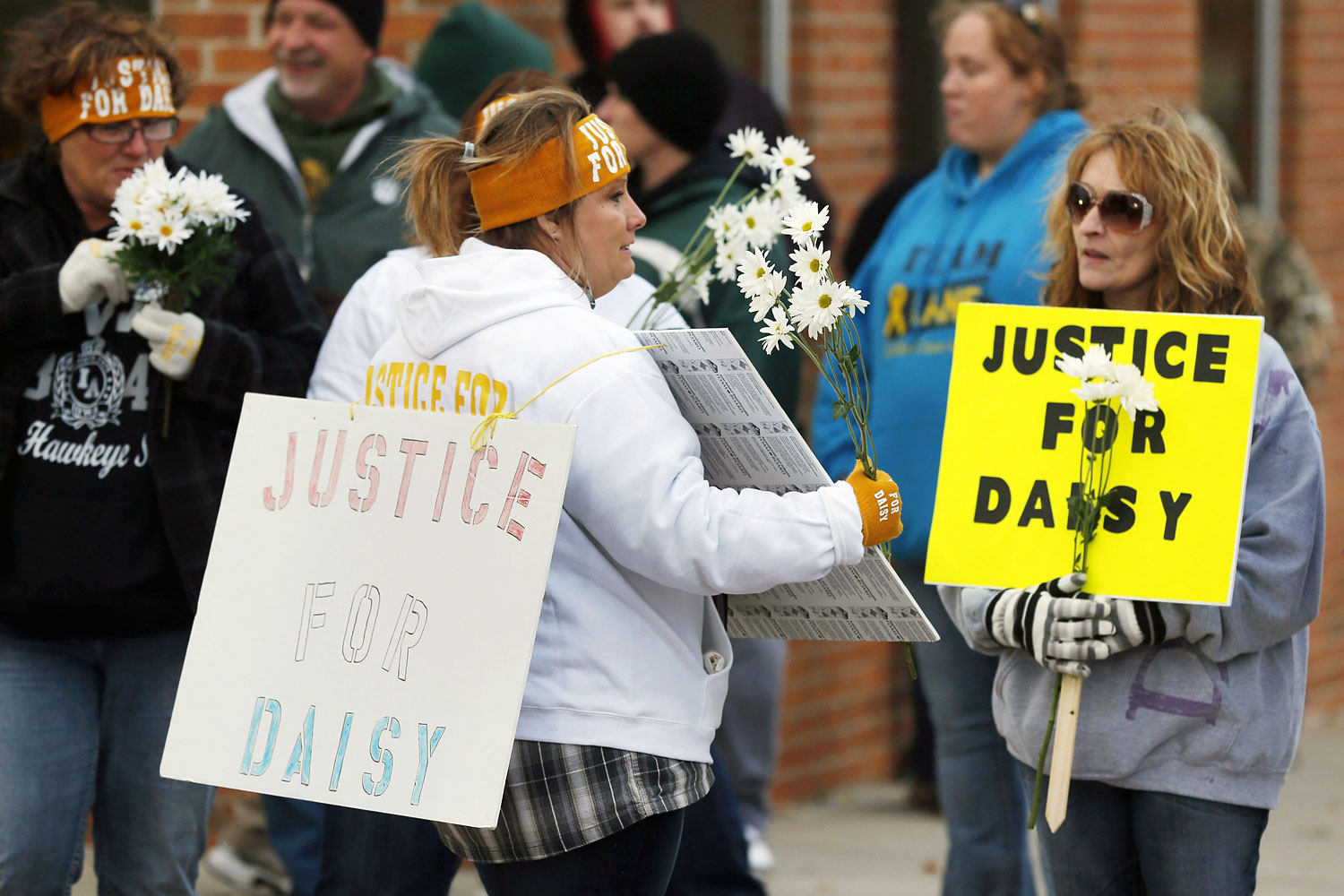
Two years and a day after a pair of teenage girls sneaked through a basement window in this farmland crossroads to party with a group of high school boys—older but apparently no wiser—the instigator pleaded guilty on Thursday to endangering the welfare of a child in a case that lit up social media and divided a community.
Matthew Barnett, 19, wore a dark blue shirt, a pale necktie, and a solemn expression as he acknowledged that he supplied Daisy Coleman, then 14, with vodka in the early hours of Jan. 8, 2012, then left her in her shirtsleeves outside her home in sub-freezing temperatures when she “was incapable of protecting or caring for herself,” in the words of the prosecution.
Left unmentioned during the 19-minute hearing was anything that transpired between the drinking of the vodka and the dumping of the drunken girl. Special prosecutor Jean Peters Baker, who was appointed to pursue the case after allegations of political favoritism were lodged against the local prosecutor, explained afterward that she filed “no sex charges” because “in this case there was insufficient evidence to go forward with a sex charge.”
Coleman and her mother Melinda Coleman expressed their satisfaction with outcome in statements released by their Kansas City attorney. “Today, I am grateful that the defendant took responsibility by pleading guilty to the charges. I am ready to move forward,” said Coleman, now 16. “To all those who supported me, I promise that what happened on January 8, 2012, will not define me forever.”
Though the Coleman family has been open about the victim’s identity—maintaining Facebook and Twitter accounts while giving numerous interviews with media outlets around the world—prosecutor Baker declined to name her in charging documents and asked a throng of reporters outside the Nodaway County Courthouse to treat her as though she were anonymous.
“I implore the media: give this young victim an opportunity to heal, to start a new narrative for herself,” Baker said.
According to a written statement by Sergeant Roger Philips of the Missouri Highway Patrol, the old narrative started with Coleman and a 13-year-old friend drinking at home while texting Barnett, who soon arranged to meet the girls and take them to a little party in his basement. After creeping through the window to avoid waking Barnett’s parents upstairs, the girls joined four older boys. “After drinking the vodka,” Philips wrote, Coleman “did not recall any subsequent events. … The next thing she remembered was waking up in her yard.”
One of the boys had sex with the younger girl and was ultimately prosecuted in juvenile court. But Nodaway County Prosecutor Robert Rice declined to bring charges of any kind against Barnett or another boy, who allegedly used a smartphone to record a sexual encounter between Barnett and Coleman.
When radio and newspaper reporters in Kansas City dug into the case, they noted that Barnett is the grandson of former Missouri state representative Rex Barnett, an influential Republican. This hint of political favoritism—and certain parallels in the case to an earlier controversy in Steubenville, Ohio—led the internet hactivist network known as Anonymous to launch a campaign in October to reopen the matter.
Baker, a Democrat from Kansas City, said Thursday that she had gone through all the evidence in the case and discussed the facts extensively with the both the victim and the accused. Although she lacked sufficient evidence to sustain sexual assault charges, Baker said, she did use the threat of felony endangerment charges to persuade the defense to accept a plea bargain.
Under terms imposed by Missouri Circuit Judge Glen Dietrich, Barnett was sentenced to four months in jail—but the sentence was suspended in favor of two years probation. During that time, Barnett must avoid alcohol, undergo substance abuse counseling and routing drug testing, and have no contact with Coleman or her family. He must perform 100 hours of community service and pay restitution of $1,800 to provide counseling services for the victim.
Barnett also delivered an apology to his victim via the prosecution team. Baker judged the young man’s statement to be “genuine,” and said she would convey his words to the Colemans “at the appropriate time.”
“Matthew Barnett accepts full responsibility and he truly regrets his actions,” defense attorney J.R. Hobbs said after the hearing. He added that “two skilled prosecutors” have now concluded that felony sex charges “are not appropriate in this matter. Further, there is absolutely no evidence that political favoritism played a role in the decision of either prosecutor.”
The Kansas City Star reported earlier this week that Daisy Coleman had been admitted to a psychiatric hospital following a suicide attempt that her mother linked to continuing harassment on social media. Prosecutor Baker declined to comment on that, and nothing in the girl’s written statement—or her mother’s—alluded to a recent crisis. Both women instead spoke hopefully of fresh beginnings.
As prosecutor Baker ended her press conference on the snow-covered steps of the red-brick Victorian courthouse, a nearby bank sign registered a temperature of 23 degrees. Though warmer than the lows spread earlier in the week by the polar vortex, this was a biting, bitter cold on the windswept hilltops of Maryville. Two years and a day ago was equally cold: a low of 21 on the night a helpless girl was dumped in shirtsleeves by a heedless boy. The case is now closed, but the thought of it merits a shiver.
More Must-Reads from TIME
- Donald Trump Is TIME's 2024 Person of the Year
- Why We Chose Trump as Person of the Year
- Is Intermittent Fasting Good or Bad for You?
- The 100 Must-Read Books of 2024
- The 20 Best Christmas TV Episodes
- Column: If Optimism Feels Ridiculous Now, Try Hope
- The Future of Climate Action Is Trade Policy
- Merle Bombardieri Is Helping People Make the Baby Decision
Contact us at letters@time.com